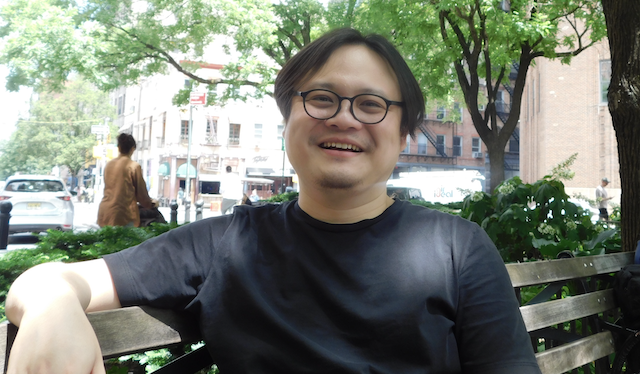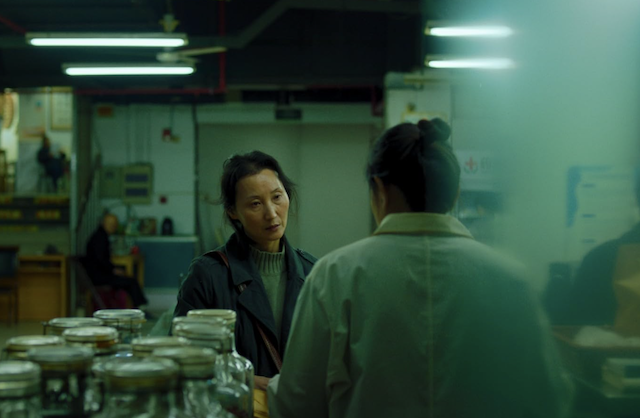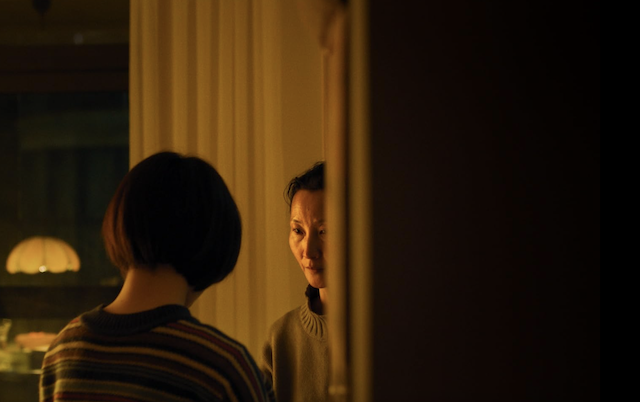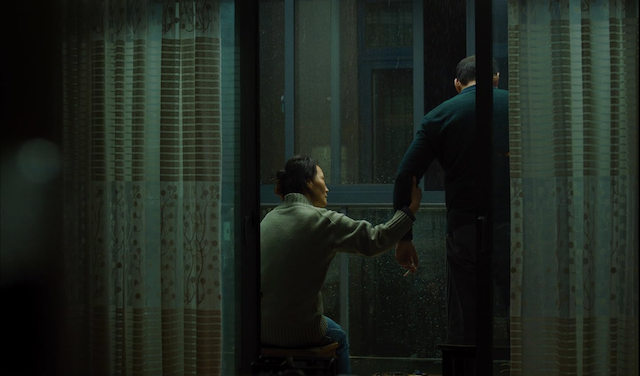
Photo by Nobuhiro Hosoki
Some Rain Must Fall : Cai is a mother and housewife who thought having a family was everything. When she inadvertently injures the grandmother of one of her teen daughter’s less privileged teammates, her supposedly perfect life descends into a menacing chaos and she starts to question everything about who she is and what she wants.
Writer and director Qiu Yang follows a series of award-winning shorts with this intimate debut feature. Slipping mystery and miasma into an existential exploration of what happens when a woman, longing for something more, throws a wrecking ball into her world, he questions not only what is class and what is family, but what is self?––Simone Ling.
Screenwriter : Qiu Yang
Cinematographer : Constanze Schmitt
Editor : Carlo Francisco Manatad, Julien Lacheray
Cast : Yu Aier, Di Shike, Wei Yibo, Xu Tianyi, Gu Tingxiu, Qin Dan, Xu Yun

© Wild Grass Films
Exclusive Interview with Director Qiu Yang
Q: You won the Short Film Palme d’Or at the 70th Cannes film Festival with “A Gentle Night.“ How did the experience of winning Palme d’Or lead to making this first feature film?
Qiu Yang: To me, it was an amazing experience. It was a surprise. I was already happy enough when the film was selected in the competition.
Q: Winning is something else.
Qiu Yang: You never expect any awards. I just went there to have a good time. The winning was, like, shocking to me. Afterwards, it was suggested by a lot of people that I should quickly make a feature film or even adapt the short film into a feature. At the time, I personally felt I wasn’t ready yet. Intuitively, I didn’t want to do that. I waited and made another two short films. I wanted to make more short films to get more experience.
Q: How often do you make short films?
Qiu Yang: I had one in 2015, one in 2017, and one in 2019. That’s what I did before. Then, I stopped working on this feature film and, at the time, felt I wanted to do more short films to get more experience. I did another short film in 2019 and then thought that it was after that I felt that [I could make a feature]. I felt, “Oh, maybe now I have this urge.
I want to do something longer because after 2017, I didn’t have that [feeling]; it wasn’t good to do it. After 2019, I wanted to do something longer. I felt there was a need. That’s when, after 2019, I went back to China in early 2020, just before the Covid broke out. Then five days later, COVID happened and very soon, I realized I’m not going to be able to get back to Paris. I was really trapped in China. I was like, “Okay, this is not going to be finished soon. I had the realization that I’m just going to set my mind on it here and finish the feature. That’s really how it happened.
Q: I heard that the character Cai, a middle-class full time housewife, was loosely based on your mother. What were the elements that stuck with you about your mother that you incorporated into this film?
Qiu Yang: When I grew up I had quite an intense relationship with my mother. It’s one of those very strict Chinese things.
Q: Sounds like a typical Asian mother, actually.
Qiu Yang: I’ll go with that. The thing is, I choose to make films, so I’m always a rebel. A single child, exactly. I was never really academic in school. I didn’t like academics. I had a quite intense relationship with her. My mother is a full time housewife as well. My father is the breadwinner. He’s always working and Not there.
I spent most of my upbringing with my mother. But the thing is, my mother is a very tough woman. When I was growing up, you actually didn’t really spend much time with your mother. You see her before you go to school in the morning, then you go to school, and spend the whole day there. Then you come back at night and have dinner with her. You go do your homework and you sleep.
I just realized, I actually spent very little time with her. I actually don’t understand who she is as a woman, as a human being. But what happened was I went to study in Australia for five years. After I graduated at 25, I decided to go back to China. I didn’t go to any bigger city like Beijing or Shanghai because I wanted to be independent.
I actually stayed in my hometown. I went back to live with my parents. But that’s because, as a filmmaker, you are a freelancer. You read books, you write stuff. I get to spend 24 hours a day, 24 seven with my mother actually. That’s really the first time I had an opportunity to observe who she is as a human being, as a woman.
I see what she does every day. nobody actually really understands or knows what a full time housewife does. It’s amazing. Actually, it’s a very intense full-time job to take care of other people. I just felt she has dedicated her whole life to taking care of me, my father, and my grandparents.
Since I was there 24/seven, I got the opportunity to really see her, to witness her secrets. She sometimes tells me her regrets in life and the difficulties she encountered. In her life with my father, and my grandparents, I started learning family secrets that they would never have told me.
As parents, they hide things from their children — I started learning those secrets. Of course, I never understood what all those things meant. You don’t understand the message or meaning behind this as a single event, but there are things that really stayed in my mind. Once I had this character, I decided to follow this character.
The way I write it’s almost like doing a novel. I have the character first then I just follow the character. There are these things that I remember just pouring out onto the paper. Of course, a lot of those things are not exactly the same, but you change things to fit the story. But even when I am writing, it’s more of a process for me to deal with. Rather than just tell a story or message, it’s more a way for me to paint a portrait of this woman.
Q: Do you think part of the Chinese communist way is that if you did one thing wrong or step off the main road in China, you get ostracized like in this film? People follow the regulations and rules that are so strict that it’s only natural that some people try to break [the rules].
Qiu Yang: It’s not necessarily one thing wrong. If you do one thing different, then you aren’t part of them. That’s what I meant in the beginning, collectivism versus individualism. It’s a long history of this mentality there — everybody should be a family; it’s more about family before an individual.
Even for me, to make a film independently or not go through the censorship system, it’s very different. What I hope is, as time goes by, there are more younger generation Chinese people who actually go to a Western country and they get educated in a more liberal way, I would say, that can open their eyes.
Then, when they come back to the country and work in the film industry, I hope things can slightly improve over the years. Obviously, if we talk about it from a government point of view, I don’t see a change that would happen but I’d be happy if it did.

© Wild Grass Films
Q: I heard that you used to be in a marching band. I’m curious about school activity in China, how do teachers teach sports and music for the band?
Qiu Yang : It was in primary school, you join a school team or a soccer team or there’s a marching band. you got chosen to do it. I was chubby at the time so I played trumpet. You have to be strong to play the trumpet. I didn’t know how to play before that. I just chose to do it and you have to spend a lot of time practicing. But I think at the time, part of the culture is if you are part of the school team, it’s a real honor because you are chosen to join this. It’s an honor thing, my parents are obviously very supportive for me to join.
I didn’t know, as a kid, you just do what your parents or school teacher tell you to do. You just do it. I was like, “Okay,” then I stopped practicing. I was actually quite good at this. I wanted to be good at it. I practiced and after two, three years in the marching band, I was at one point where I was like, I don’t want to do this anymore. I lost interest in it.
I fell in love with other things. Even though I’m good at it, I felt like I was forced to spend a lot of time every day practicing. The real thing is that it was an inspiration for my film. I wanted to quit the marching band but then it became really difficult because the school would say, “Oh, we spent all this time, and resources to train you. Now you want to quit, it’s almost as if I was a traitor. We trained you. You should be loyal to us.” As a kid, I was like,” I don’t care. I just don’t want to do it.” My parents tried to convince me, but I just didn’t care.
Q: The country hates to accept you as a quitter but at the same time, children are trying to explore other things than what they want you to do. If it didn’t fit, you wanted it to explore something else.
Qiu Yang: You’re really right. Also, children are not used to this social norm, like the class structure. Unlike an adult, they are like, “Oh, we have to listen to a teacher, don’t disobey them. But as children, we don’t know these things. We’re like “I just don’t want to do it, I’m not happy. Why are you forcing me to do it? I really wanted to quit.” It was a big fuss and my parents had to get involved trying to convince the teacher to let me go. It was a huge mess.
Q: In this film, there are a lot of scenes that are very dark or are wide shots. I barely see the broad daylight. Talk about the visual approach of this film. What are the challenging elements?
Qiu Yang: In the beginning, I spoke with my cinematographer Constanze Schmitt and we felt it’s not a plot driven drama. It’s really a character driven drama. We are just observing her life and what she’s going through. We wanted to show that in a way it’s more like observational. We wanted to keep a bit of distance. You almost feel like everything you are peeping through from behind something.
The camera is almost like the audience because we are watching and observing. There’s actually a third character in the room, which is the audience. That’s the feeling that we tried to create. Also we shot a lot from her sides or back, or through doorways, in a way to discover this woman is a jigsaw.
We see different parts of her, different sides of her, different shades of who she is. We are always discovering new things about her and this is what we want. we were like, if we intentionally try not to show many of the front on. you don’t really see fully who she is. We are always showing sides and differences.
Q: In this film you talked about taking tests or failing tests. In China, there are so many people that it isn’t easy to even get into the university, what are the things that you felt pressured about Chinese university’s entrance exam?
Qiu Yang: Yes, It’s actually quite horrible. The pressure, when you’re young, you have to take entrance tests from primary school to junior high, then to junior high, to high school, then high school to university.
That’s one of the reasons I really rebelled against this because, I used to be good in primary school, I was a good student, I was with a high academic score. Now I wasn’t in junior high. I think that’s when I went into puberty. I discovered literature, music and all that.
I used to paint a lot, but I think when I was in junior high, I discovered other arts, literature and music, so that’s when I fell in love. I was not saying I’m not learning, but it’s like I go to class, school, like teachers teaching, I was reading books at that time until the test. But then, which means my academic score was really bad. But then that’s the pressure that comes from my parents.
They’re like, if you don’t keep doing this, you’re not going to go to a good high school. You’re not going to university. You’re not going to be able to find a good job. And to find a good job is very important. At that time, I didn’t really care because I was young. As kids never care about these things. So that’s why I had a really intense relationship with my parents, with my mom but I think in a way that pressure and also the struggle actually turns into a really intense conflict between me and my school as well.
I had a big conflict with my schools. So I think that’s why in the end, what my parents said, you have Two opportunities. You have two options. If you keep doing this, you’re not going to go to university. You finish school, then you find a job like in a supermarket or whatever.
Then that’s your life. Or you go overseas. You go abroad because I went to Australia. You go abroad to study because the way in Western countries they study, that sort of system or culture is a bit different. Maybe I would like it. And obviously I chose to go overseas. I felt the academic pressure was much lower.

© Wild Grass Films
Q: Most of the cast are relatively unknown to us, could you talk about how you gathered those actors, what kind of preparation or rehearsal that you did to make this film?
Qiu Yang: I work a lot with non-professional actors, with my short films and brand. It’s what I’m comfortable with. With this film, it was the first time I worked with a casting director because it’s a feature film, it’s too much for me to do everything.
She did a lot of street casting. It was just real people in my city with no acting experience. just people. Obviously we do tests. The idea for us is not finding actors. We are not trying to look for people who can act. We are looking for real people who have real characters.
And to find one who has a character that’s similar to my character. They don’t have to act, they just need to be themselves. That means there are two types of non professional casting. This is what I do. Then obviously with the main character, you need to perform, you need to have the ability, so you can’t be totally a non actor.
Once we found her, we decided to go with this actress and she’s quite subtle. Her performance is subtle enough but through her eyes, you can see she’s hiding a lot of things. To me, that’s the important thing about her performance. It’s not about expressing, it’s about hiding. That’s why with real women, they hide their emotions. But then, we only had about one month of training and preparation.
Q: One month’s preparation?
Qiu Yang: But it’s like we designed a daily routine of what we imagine. Thai’s daily routine as a full time housewife was: in the morning, you send kids to school, you prepare breakfast, and then you do housework and go to the market. That kind of thing. We designed a weekly routine.
Then, we asked her to follow this routine and live in the apartment where we shot the film and try to make the place her home. Anyway, we were trying to create a situation where everything’s real. She’s not pretending to be someone else. We did that for about one month. That’s almost all we did. You don’t realize how physically tough being a full time housewife is until you actually see and do it. It was tough.
Q: This film was presented at the encounter section of Berlin Film Festival. Talk about what that experience was like?
Qiu Yang: It was nice. I think it was the first. I’ve been to Berlin before but it was my first time to have a film premiere in the festival and I had a great time. I love Berlin. I live in Paris, but my DOP is from Berlin, so I visit her quite often. I just love the city. It’s a wonderful, amazing place. And the festival is different from, say, Cannes or Venice.
It’s a true city festival. It’s all of the city and it’s open for everyone. Anyone can buy tickets to watch a film. I really had a great time. We premiered at a really wonderful venue called Academy of Arts and it was just really nice. There’s great food in Berlin and it’s not very expensive. Berlin is cheaper than Paris. Paris is expensive.
Q: New York is even more, probably.
Qiu Yang: It’s really nice and Berlin has the best nightclubs in the world.
Q: I love techno music in particular. I love Ryuichi Sakamoto and the YMO.
Qiu Yang: Is it Yellow Magic Orchestra?
Q: Yellow Magic Orchestra. obviously, Sakamoto’s score and soundtrack. Did you see the latest documentary that his son made?
Qiu Yang: In Paris. I was at a screening. Actually I know Sora.
Q: You do?
Qiu Yang: I never met him, but we are friends. I love the short film “Chicken” that he did a few years ago. It’s really great, and we’re working with the same producers.
Q: In your film, even though the character talks about this old lady a lot, you never see her intentionally which creates a certain sense of suspense or mystery. At the same time you focus on each character. What was the idea behind that?
Qiu Yang: Obviously it was intentional. Sometimes, when I watch a film, there’s a careful balance between what’s seen and unseen. I love reading books, so that’s one thing that the power of literature is about — imagination. If you read stuff you can actually imagine things, In film it is a different sort of medium. It operates within its own system. you see my film, and a lot of story happens off screen. There’s a violence that happens off screen. To me, the violence off screen is even stronger than actually witnessing the violence.
That’s why I want to do this. There are certain things in the film they talk about, but you never really see it. This injured woman is like a red herring. It’s like I set up this event. She injured this woman, but the film is really not about the old woman herself. It’s really about the life of this main character. You hear about what’s happening to her, they talk about what’s happening to her, but you don’t see the old woman. I felt it was the right to do it.
Q: It’s a mysterious thing, and the main character Cai certainly feels the burden of injuring the old lady, it’s more heavy in a certain sense, if you’re not showing that. If you show the old lady, you understand the situation. But if you do not show the lady, you live in a mystery that gives you a certain heaviness to that.
Qiu Yang: It’s the same for the main character, because she doesn’t know what’s going on, what’s happening with the old woman. She’s shielded by her husband. The husband is, “I’ll take care of you, don’t worry about it.” But obviously something is not going well. I want to put the audience in the same shoes, because we also don’t know what’s going on. It sounds quite bad, but how bad it is, it’s up to your imagination. It’s this kind of unease, nervousness to the character. With Tsai she’s going through her daily troubles with this at the back of her mind. Also with the grandson there, the boy has the birthmark which served as embodiment of his pressure or the threat of the incident.
If you like the article, share your thoughts below!
Check out more of Nobuhiro’s articles
Here’s the trailer of the film.

